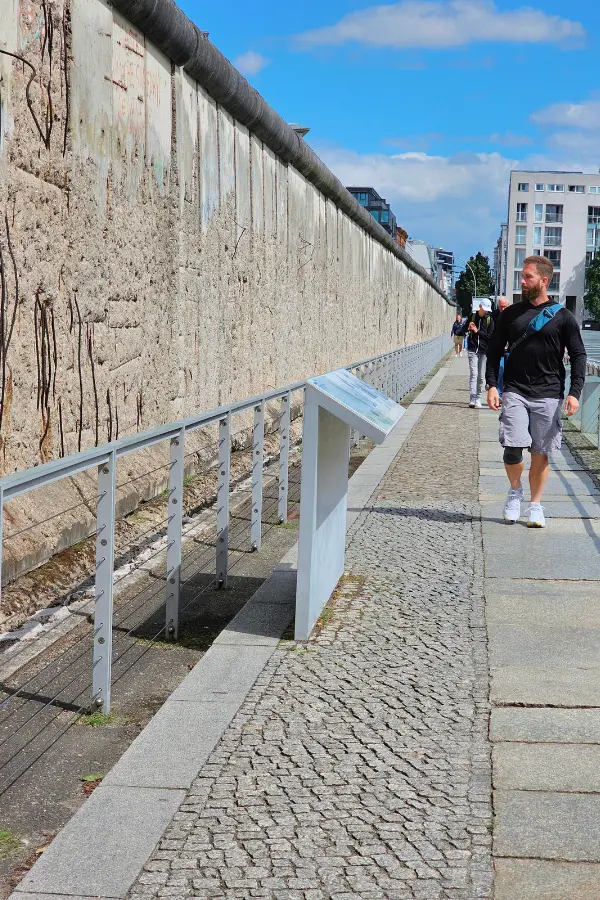Recipe Cards now available in the shop!
- Home
- Common German Phrases for Travel
Common German Phrases for Travel: Your Essential Guide.
By: Eran Fulson / Traveler, writer, and curious observer of all things German.
Are you planning a trip to Germany or some other German-speaking country? Take it from an English speaker like me: learning some common German phrases for travel will make your next visit even better.

On this page:
Whether you’re exploring the fairy-tale valley of Schwangau, walking the remnants of the Berlin Wall, or sipping Bavaria’s rich beer-brewing heritage, knowing some basic German phrases will help you navigate with confidence and make a good impression on the locals.
In this comprehensive guide, I’ll cover essential German travel phrases, basic German words, and useful expressions that will make your journey smoother and more enjoyable.
After all, you know at some point a coffee or beer will need ordering, and subsequently, a bathroom will be needed. Don’t ask me how I know, but those moments are not the time to be calmly pulling up a translation app.
So let’s dive in and start learning some German language basics for your next travel adventure.
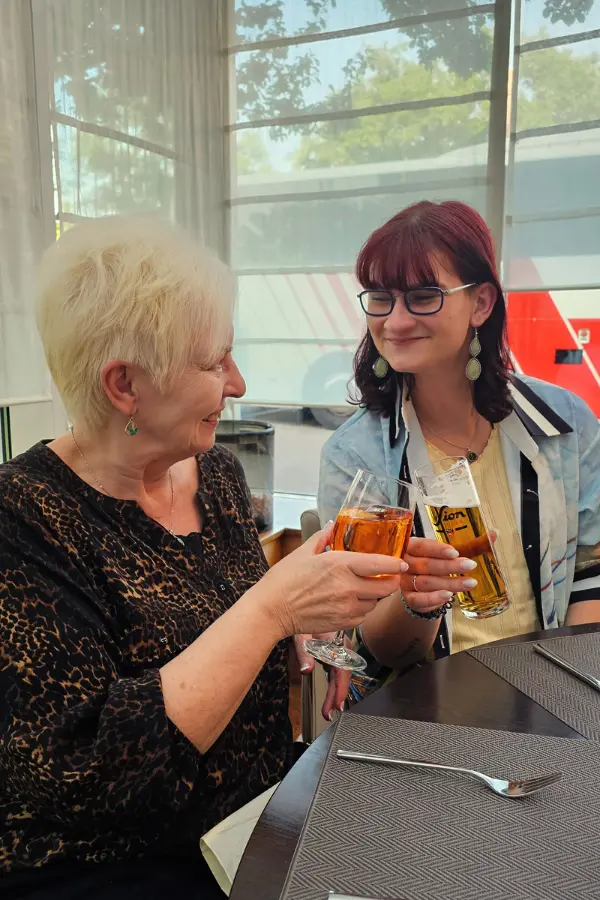 Oma and Lydia are practicing their "Prost!"
Oma and Lydia are practicing their "Prost!"Why Learn Common German Phrases for Travel?
A Better Travel Experience: Understanding and using basic German phrases allows you to engage more deeply with the local culture and people.
Navigate with Ease: From asking for directions to ordering food, knowing key German words and phrases makes getting around much easier.
Shows Respect: Locals appreciate when visitors make an effort to speak their native language, even if it’s just a few words or a simple "Hallo."
Overcome Language Barriers: While many Germans speak English, especially in tourist areas, knowing some German can help in less touristy locations or in case of emergencies.
Essential German Greetings and Pleasantries
Starting with some basic German greetings and polite expressions:
1. "Hallo" (hah-loh) - Hello
2. "Guten Tag" (goo-ten tahg) - Good day
3. "Guten Morgen" (goo-ten mor-gen) - Good morning
4. "Guten Abend" (goo-ten ah-bent) - Good evening
5. "Auf Wiedersehen" (owf vee-der-zey-en) - Goodbye
6. "Tschüss" (choos) - Bye (informal)
7. "Bitte" (bi-te) - Please
8. "Danke" (dan-ke) - Thank you
9. "Entschuldigung" (ent-shool-di-gung) - Excuse me/Sorry
That last one, Entschuldigung, should be at the top of your must-learn list of German phrases. It’s invaluable when you’re trying to get the attention of a hotel receptionist, bartender, or anyone who looks like they know where they’re going when you don’t.
Introducing Yourself in German
When meeting new people, these phrases will come in handy:
1. "Ich heiße..." (ikh hye-se) - My name is...
2. "Wie heißen Sie?" (vee hye-sen zee) - What's your name? (formal)
3. "Wie heißt du?" (vee hyst doo) - What's your name? (informal)
4. "Freut mich, Sie kennenzulernen" (froyt mikh, zee ke-nen-tsoo-ler-nen) - Nice to meet you (formal)
5. "Ich komme aus Amerika" (ikh ko-me ows a-me-ri-ka) - I'm from America
Common German Phrases for Travelers
While this is not an exhaustive list of basic German phrases, every journey begins with a first step. Then another, and another. Some of the most essential phrases in relation to various travel situations would include:
Asking for Help
1. "Sprechen Sie Englisch?" (shpre-khen zee eng-lish) - Do you speak English?
2. "Ich verstehe nicht" (ikh fer-shtey-e nikht) - I don't understand.
3. "Können Sie mir helfen?" (kur-nen zee meer hel-fen) - Can you help me?
4. "Wo ist...?" (vo ist) - Where is...?
5. "Wie komme ich zu...?" (vee ko-me ikh tsoo) - How do I get to…?
Also good to remember is that in more formal situations, or when addressing older individuals, it’s polite to use the formal "Sie" instead of the informal "du" when saying "you."
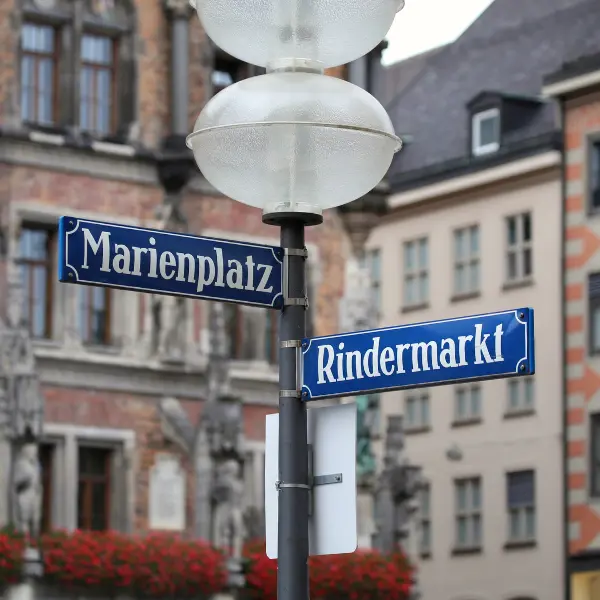 Where did you come from and where are you going?
Where did you come from and where are you going?Transportation
1. "Wo ist der Bahnhof?" (vo ist der bahn-hof) - Where is the train station?
2. "Eine Fahrkarte nach..., bitte" (ay-ne far-kar-te nahkh..., bi-te) - A ticket to..., please.
3. "Wann fährt der nächste Zug nach...?" (van fert der nek-ste tsoog nahkh) - When does the next train to... leave?
4. "Ich möchte ein Taxi bestellen" (ikh murch-te ayn tak-si be-shte-len) - I'd like to order a taxi.
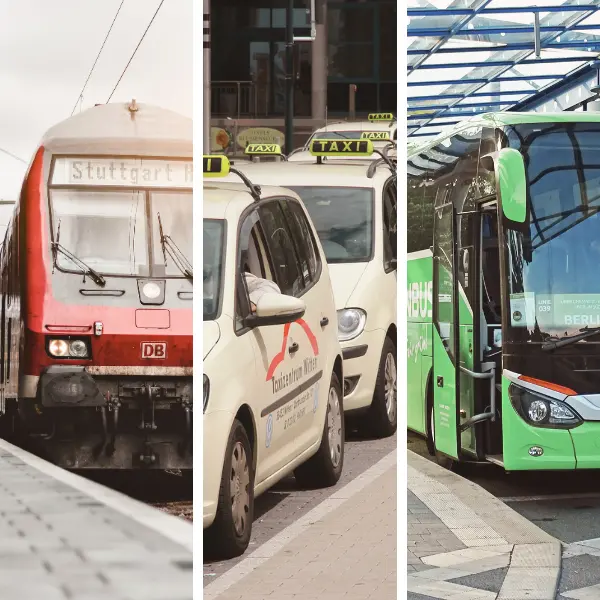
Dining and Shopping
1. "Ich hätte gerne..." (ikh het-te ger-ne) - I would like...
2. "Die Speisekarte, bitte" (dee shpy-ze-kar-te, bi-te) - The menu, please.
3. "Zum Mitnehmen, bitte" (tsum mit-ney-men, bi-te) - To go, please.
4. "Wie viel kostet das?" (vee feel kos-tet das) - How much does this cost?
5. "Wo kann ich...kaufen?" (vo kan ikh...kow-fen) - Where can I buy...?
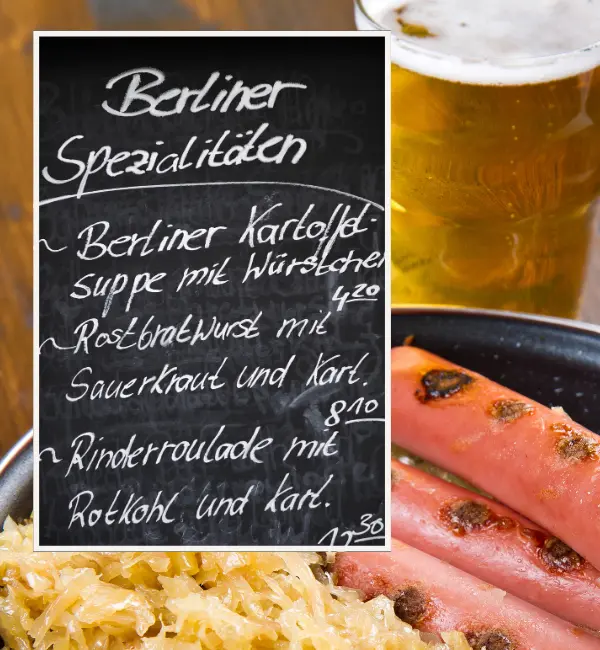 Don't always rely on there being an English menu.
Don't always rely on there being an English menu.Emergencies
1. "Hilfe!" (hil-fe) - Help!
2. "Ich brauche einen Arzt" (ikh brow-khe ay-nen artst) - I need a doctor.
3. "Wo ist das nächste Krankenhaus?" (vo ist das nek-ste kran-ken-hows) - Where is the nearest hospital?
4. "Rufen Sie bitte einen Krankenwagen" (roo-fen zee bi-te ay-nen kran-ken-va-gen) - Please call an ambulance.
Tips for Pronouncing German Words
German pronunciation can be tricky for an English speaker, but the general rule of thumb is to say it as you see it. But the following tips are useful for those "Huh?" moments:
1. The 'ch' Sound: This sound doesn't exist in English. It's similar to the 'h' in 'huge' but more guttural. Practice with words like "ich" (I) and "mich" (me).
2. The 'ü' Sound: Purse your lips as if you're going to say "oo" but say "ee" instead. This gives you the German 'ü' sound.
3. The 'r' Sound: German 'r' is pronounced at the back of the throat, almost like a soft growl.
4. Final Consonants: In German, final consonants are pronounced clearly, unlike in English where they're often softened.
5. Vowels: Where two vowels are side-by-side, you always place emphasis on the last vowel. So in the city "Kiel" you would lean into the "e" said like "Keel."
Cultural Tips for Traveling in Germany
As in traveling to any country, understanding some cultural norms can help you navigate social situations more smoothly.
1. Punctuality: Germans value punctuality highly. Being on time is seen as a sign of respect.
2. Formal Address: Use the formal "Sie" when addressing strangers, especially those older than you or in positions of authority.
3. Beer Culture: Germany is famous for its beer. When toasting, make eye contact and say "Prost!" (prohst).
4. Recycling: Germans are environmentally conscious. Pay attention to recycling rules in public places and accommodations.
5. Cash is King: While credit cards are becoming more widely accepted, many places still prefer cash. Always have some euros on hand.
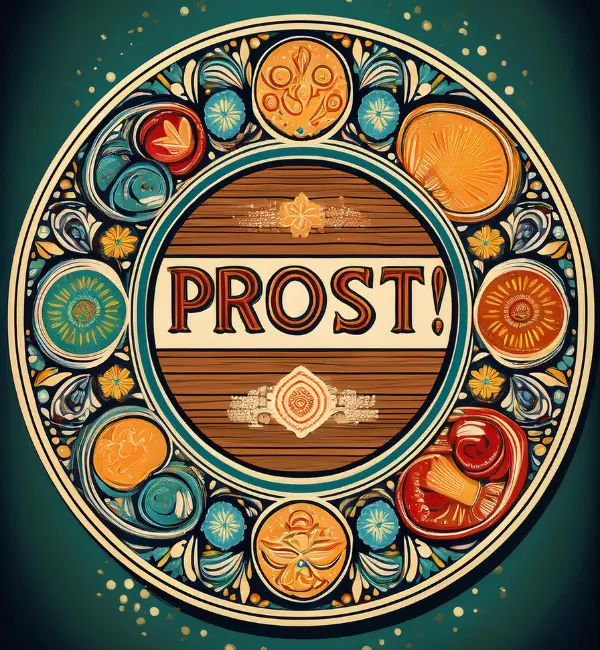 Be sure to lock in that eye contact.
Be sure to lock in that eye contact.Beyond Basic Phrases: Expanding Your German Vocabulary
If you’re going to go full-German and plan on devoting as much time in your prep as it takes you to fly over, then I’d recommend the following additional resources:
1. Language Learning Apps: Duolingo, Babbel, and Memrise offer free courses in German. Find whatever works best for you, but Duolingo is the one I've spent the most time on.
2. Podcasts: "Coffee Break German" and "GermanPod101" provide audio lessons for learners.
3. YouTube Channels: "Easy German" and "Deutsch für Euch" offer free video lessons and real-life German conversations.
4. Deutsche Welle: This German broadcaster offers free online German courses for all levels.
Conclusion: Embrace the Language and Culture
Learning the common German phrases for travel and basic words can significantly boost your experience in German-speaking countries.
It allows you to connect more deeply with the culture, navigate with greater ease, and show respect to the locals. After all, you'd value the same effort if they were visiting your country.
Remember, even if your pronunciation isn’t perfect, most Germans will appreciate your effort to speak their language.
So, whether you’re planning to explore the vibrancy of Berlin, cruise down the romantic Rhine, or hike in the stunning Bavarian Alps, take some time to learn these essential German phrases.
Not only will they make your trip smoother, but they’ll also enrich your cultural experience and potentially help you make new friends along the way.
Gute Reise und viel Spaß! (Have a good trip and have fun!)
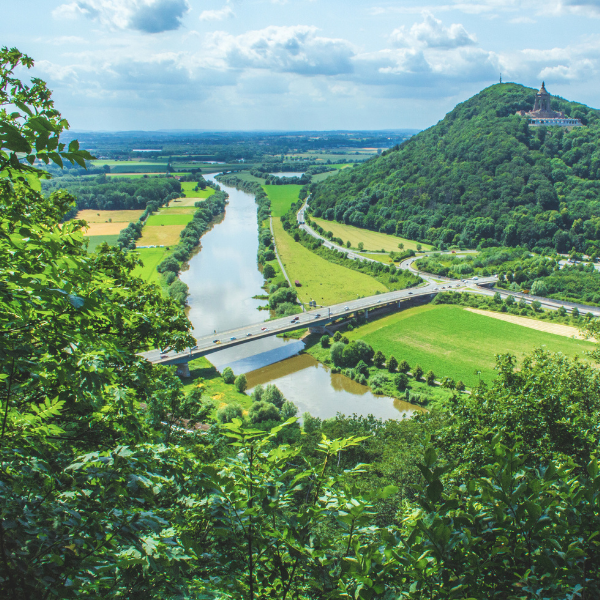 A beautiful view in any direction.
A beautiful view in any direction.FAQ About Common German Phrases for Travel
Some of these are covered in the post above, but for a quick reference, here are some answers to common questions about German phrases and language use:
What are the key German phrases for travelers?
What are the key German phrases for travelers?
You’ll be a savvy traveler by familiarizing yourself with these essential German phrases:
- Hallo (hello)
- Guten Tag (good day)
- Auf Wiedersehen (goodbye)
- Danke (thank you)
- Bitte (please)
- Ja (yes)
- Nein (no)
These are the most useful and basic German words to learn. They’re easy to pick up and will come in handy in various situations. Always remember that even using simple phrases can go a long way in making a good impression and showing respect for the local culture.
What is an easy German phrase to say?
What is an easy German phrase to say?
As mentioned above, "Wie ghet’s?" (How are you?) is not only common but also easy to nail down. This informal greeting is widely used and easy to roll off the tongue. Even if you don’t understand what their answer is, the road to adventure is paved with good intentions.
Other simple and useful phrases include:
- "Vielen Dank" (Thank you very much)
- "Mein Name ist _____" (My name is _____)
- "Können Sie das bitte wiederholen?" (Could you say that again please?)
Using these show a general level of politeness and lays the groundwork for basic conversation.
What is considered rude or polite in Germany?
What is considered rude or polite in Germany?
I’ve heard it said that German etiquette can be a bit of a minefield for the uninitiated. But most Germans, like many cultures, typically don’t appreciate someone getting right up in their personal space with a speaking volume turned up to eleven.
So what would I recommend to help steer away from a cultural faux pas?
- Having loud conversations, talking loudly on the phone, or listening to loud music in public is considered impolite. This seems obvious, but you’d be surprised...
- Germans value their privacy. A closed door doesn't necessarily mean you're not welcome, but it's polite to knock first.
- Punctuality is highly valued in German culture. Being on time is seen as a sign of respect.
- Use the formal "Sie" when addressing strangers, especially those older than you or in positions of authority.
- It's polite to maintain eye contact during conversations and when making toasts.
I know I’ve gone on about it more than once, but making even a little effort goes a long way and can greatly improve your travel experience. You never know, you might even make a friend or two along the way. And free local knowledge is better than any you buy.
By familiarizing yourself with these common phrases and cultural tips, you’ll be well-prepared for your journey through Germany and any other German-speaking countries (I’m looking at you Austria and Belgium, among others).
Don’t be afraid to tell the German you’re speaking to that you’re a little wobbly on the language - most Germans appreciate the effort and will be happy to help you improve.




